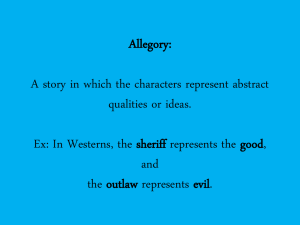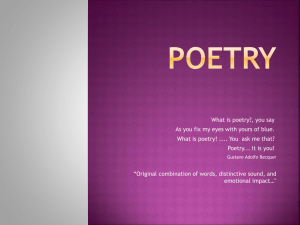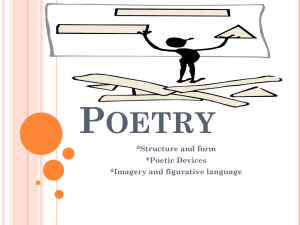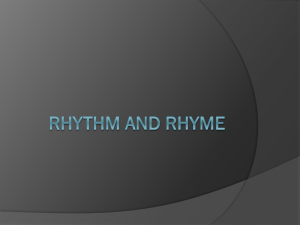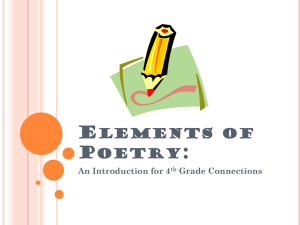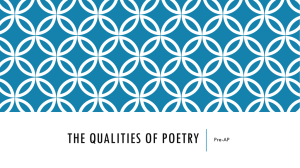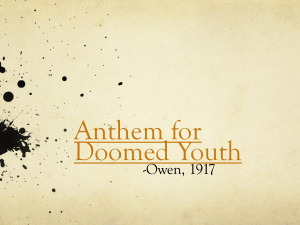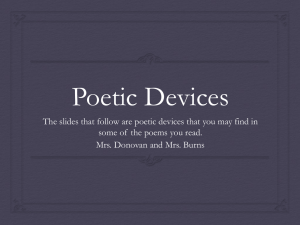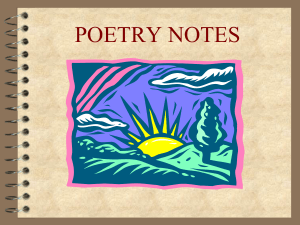Literature Terminologies PPT
advertisement
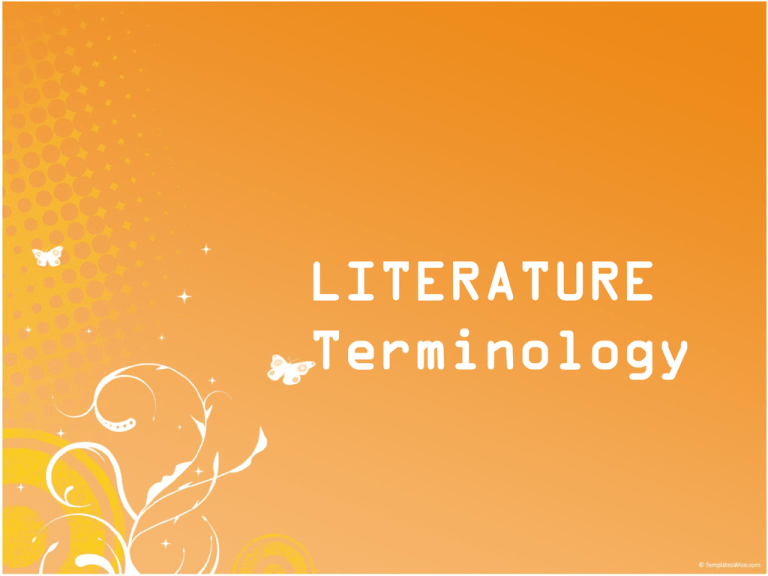
LITERATURE Terminology What is Poetry? •A type of literature that expresses ideas, feelings, or tells a story in a specific form (usually using lines and stanzas) Point of View in Poetry Poet The poet is the writer of the poem. Speaker/Persona The speaker of the poem is the narrator. When the poet creates a character to be the speaker, that character is called the persona. The poet imagines what it is like to enter someone else's personality. Example: Robert Browning's My Last Poetry Form Form The appearance of the words on the page Line A group of words together one line of the poem Stanza A group of lines on arranged Kinds of Stanzas Couplet = a two line stanza Triplet (Tercet) = a three line stanza Quatrain = a four line stanza Quintet = a five line stanza Sestet (Sextet) = a six line stanza Poetry Form Couplet A couplet is a pair of lines of verse that form a unit. Most couplets rhyme aa, but this is not a requirement. aa bb cc dd ee ff... etc. Example: I THINK that I shall never see a A poem as lovely as a tree. Poetry Form Sonnet The term sonnet is derived from the Provençal word sonet and the Italian word sonetto, both meaning little song. By the thirteenth century, it had come to signify a poem of fourteen lines following a strict rhyme scheme and logical structure. Poetry Form Petrarchan/Italian Sonnet In its original form, the Italian sonnet was divided into an octave followed by a sestet. The octave stated a proposition and the sestet stated its solution with a clear break between the two. Poetry Form Petrarchan/Italian Sonnet The octave rhymes a-b-b-a, a-b-b-a. For the sestet there were two different possibilities, c-d-e-c-d-e and c-d-c-c-d-c. In time, other variants on rhyming scheme were introduced. this Typically, the ninth line created a "turn" or volta, which signaled the change in the topic or tone of the Poetry Form Shakespearean Sonnet The form consists of three quatrains and a couplet. The couplet generally introduced an unexpected sharp thematic or imagistic "turn". The usual rhyme scheme was a-b-a-b, c-d-c-d, e-f-e-f, g-g. Example: Sonnet 116 Poetry Form Villanelle • It is 19 lines long, but only uses two rhymes, while also repeating two lines throughout the poem. • The first five stanzas are triplets, and the last stanza is a quatrain such that the rhyme scheme is as follows: "aba aba aba aba aba abaa." Poetry Form Villanelle • The tricky part is that the 1st and 3rd lines from the first stanza are alternately repeated such that the 1st line becomes the last line in the second stanza, and the 3rd line becomes the last line in the third stanza. • The last two lines of the poem are lines 1 and 3 respectively, making a rhymed couplet. Poetry Form Ballad A poem that tells a story similar to a folk tale or legend and often has a repeated refrain. Cinquain A cinquain has five lines. Elegy A sad and thoughtful poem lamenting the death of a person. Poetry Form Epic A long, serious poem that tells the story of a heroic figure. Lyric A short poem usually written first person point of view in expresses an emotion or an idea or describes a scene. Does not tell a story. Poetry Form Pastoral A poem that depicts rural life in a peaceful, idealized way for example of shepherds or country life. Ode A lyric poem, typically addressed to a particular person or a thing, usually of a serious or meditative nature and having an elevated style About Poetry Poetry utilizes a broad range of figurative language, imagery, and symbolism—all devices requiring that the reader infer an unstated meaning. We talk of the language as being "poetic" when it draws heavily on either indirect expression of ideas through imagery, symbolism, or figurative language or it draws heavily on the sound (whether rhythm Rhyme Scheme Couplet A couplet is a pair of lines of verse that form a unit. Most couplets rhyme aa, but this is not a requirement. aa bb cc dd ee ff... etc. Example: I THINK that I shall never see a A poem as lovely as a tree. Poetic Devices • Rhyme • Similes • Rhyme Schemes • Metaphors • Rhythm • Hyperbole • Meter • Litotes • Line Length • Idioms • Onomatopoeia • Personification • Alliteration • Allusions • Consonance • Symbolism • Assonance • Imagery • Refrain • Diction Sounds in Poetry • • • • • • • Rhyme Rhyme Scheme Rhythm Meter Free Verse Blank Verse Onomatopoeia • • • • • • Alliteration Consonance Assonance Refrain Euphony Cacophony Rhyme • A rhyme is a repetition of similar sounds in two or more words. • Rhyme helps to unify a poem; it also repeats a sound that links one concept to another, thus helping to determine the structure of a poem. • When two subsequent lines Rhyme • A rhyme is a repetition of similar sounds in two or more words. • Rhyme helps to unify a poem; it also repeats a sound that links one concept to another, thus helping to determine the structure of a poem. • When two subsequent lines Rhyme: Types End Rhymes A word at the end of one line rhymes with a word at the end of another line Whose woods these are I think I know. His house though; is in the village He will not see me stopping here Rhyme: Types Perfect Rhymes A perfect rhyme — also called a full rhyme or true rhyme — is when the later part of the word or phrase is identical sounding to another. – The vowel sound in both words are identical. — e.g. "sky" and high“ Rhyme: Types Perfect Rhymes Perfect rhymes can be classified according to the number of syllables included in the rhyme. •masculine: a rhyme in which the stress is on the final syllable of the words. (rhyme, sublime) •feminine: a rhyme in which the stress is on the penultimate Rhyme: Types Internal Rhymes Internal rhyme, or middle rhyme, is rhyme which occurs within a single line of verse. The grains beyond age, veins of her mother the dark -Dylan Thomas Once upon a midnight dreary, while I pondered weak and weary. Rhyme: Types Imperfect/Half Rhymes Occurs when words sound very similar but do not correspond in sound exactly. The final consonants of stressed syllables agree but the vowel sounds do not match; thus a form of consonance. frowned and friend, hall and hell. Rhyme: Uses • Half-rhymes allow a poet a more subtle range of rhyming effects, especially when combined with other rhyming schemes, and help to avoid the sing-song chiming of full rhymes. • Moreover, half-rhymes can introduce a slight note of discord (a lack of complete Rhyme Scheme • A rhyme scheme is the pattern of rhyme. • Usually referred to by letters to indicate lines rhyme. using which • For example "A,B,A,B," indicates a four-line stanza in which the first and third lines rhyme, as do the second Rhyme Scheme • Here is an example of this rhyme scheme from To Anthea, Who May Command Him Any Thing by Robert Herrick: Bid me to weep, and I will weep A While I have eyes to see; B And having none, and yet I will keep A Rhythm • Rhythm is a musical quality produced by the repetition of stressed and unstressed syllables. • The beat created by the sounds of the words in a poem. • Rhythm meter, line can be created by rhyme, alliteration, length and Rhythm: Example O CAPTAIN! my Captain! our fearful trip is done; The ship has weather’d every rack, the prize we sought is won; The port is near, the bells I hear, the people all exulting, While follow eyes the steady keel, the vessel grim and daring: But O heart! heart! heart! O the bleeding drops of red, Where on the deck my Captain lies, Meter • A pattern of stressed unstressed syllables. and • Meter occurs when the stressed and unstressed syllables of the words in a poem are arranged in a repeating pattern. • When poets write in meter, they count out the number of Meter: Example The unstressed syllables are in blue and the stressed syllables in red. Shall I comPARE thee TO a SUMmer’s DAY? A pair stressed of unstressed and syllables makes up a Meter • Some feet in verse and poetry have different stress patterns. For example, one type of foot consists of two unstressed syllables followed by a stressed one. Another type consists of a stressed one followed by an Meter In all, there are five types of feet. Iamb (Iambic) Unstressed 2 Syllables Trochee (Trochaic) Stressed 2 Syllables + + Stressed Unstressed Spondee (Spondaic) Stressed + Stressed 2 Syllables Anapest (Anapestic) Unstressed + Unstressed + Stressed 3 Syllables Dactyl (Dactylic) Stressed Unstressed 3 Syllables + Unstressed + Meter & Symbols • stressed syllables signified by / are • unstressed by u iambic: u / Eg: Hello trochaic: / u Eg: Under spondiac: // Eg: Baseball anapestic: u u / Eg: Understand dactylic: / u u Eg: Canopy Meter & Line Length The length of lines–and thus the meter–can also vary. Following are the types of meter and the1 line length: •Monometer •Pentameter 5 Foot Feet •Dimeter 2 Feet •Hexameter 6 Feet •Trimeter 3 Feet •Heptameter Feet •Tetrameter 4 •Octameter 7 8 Meter & Line Length The line contains five feet in all, as shown below. 1 2 3 4 5 ShallI..|..comPARE..|..theeTO..|..aSUM..|..mer’s DAY? A foot containing an unstressed syllable followed by a stressed syllable (as above) is called an iamb. Because there are five Free Verse Poetry • Unlike metered poetry, free verse poetry does NOT have any repeating patterns of stressed and unstressed syllables. • Does NOT have rhyme. • Free verse poetry is conversational - sounds someone talking with you. very like • A more modern type of poetry. Blank Verse Poetry • Is any verse comprised of unrhymed lines all in the same meter, usually iambic pentameter. You stars nativity, that reign'd at my Whose influence hath allotted death and hell, Now draw up Faustus like a foggy mist Into entrails of yon labouring Onomatopoeia • Is a word that imitates or suggests the source of the sound that it describes. Example: Merriam Onomatopoeia by Eve Alliteration • Consonant sounds repeated beginnings of words at Tyger, tyger burning bright, In the forest of the night; What immortal hand or eye Could name thy fearful symmetry? In what distant deeps or skies Burnt the fire of thine eyes? On what wings dare he aspire? the Consonance • Consonance is the repetition consonant sounds within words. of • Consonance is very similar to alliteration, but the distinction between the two lies in the placement of the sounds. • If the repeated sound is at the start of the words, it is alliteration. If it is anywhere else, it is consonance. In most cases, consonance refers to the end Assonance • Repeated VOWEL sounds in a line or lines of poetry. • Like alliteration, it is the sound rather than the letter used that is important. • (Often creates near rhyme.) Lake Fate Base Fade (All share the long “a” sound.) Example “Shall ever medicine thee to that Refrain • A refrain is a repeated part of a poem, particularly when it comes either at the end of a stanza or between two stanzas. There lived a lady by the North Sea shore, Lay the bent to the bonny broom Two daughters were the babes she bore. Fa la la la la la la la la. As one grew bright as is the sun, Lay the bent to the bonny broom So coal black grew the other one. Euphony • When the sounds of words in a line create an effect that is pleasing to the ear. • Euphony is refers to pleasant spoken sound that is created by smooth consonants such as "ripple'. Example: To Autumn - by John Keats Season of mists fruitfulness, and mellow Close bosom-friend of the maturing sun; Cacophony • A cacophony is a mix of harsh, displeasing, hissing or clashing sounds. Sometimes cacophony is accidental, and sometimes it is used intentionally for artistic effect. Example: Jabberwocky by Lewis Carroll 'Twas brillig, and the slithy toves Did gyre and gimble in the Figurative Language • When language is used this way, it is not intended to be interpreted literally or directly as the meaning is not equivalent to that of its component words. • In our daily life, we use phrases such as “once in a blue moon” and “15 minutes of fame” which are not to be understood literally, although the actual meanings are derived from what is described. Figurative Language • Similes • Metaphors • Extended Metaphors • Hyperbole • Litotes • Idioms • Personification Simile Implied similarity between two things or people being compared, using ‘like’ or ‘as’. A Red, Red Rose - Robert Burns O My Luve's like a red, red rose, That's newly sprung in June; O My Luve's like the melodie That's sweetly played in tune. Metaphors The thing that is described is referred to as the thing to which it is being compared. “All the world’s a stage, and we are merely players.” - William Shakespeare Extended Metaphor A metaphor that goes several lines or possible the entire length of a work. Example: I Know Why the Caged Bird Sings - Maya Angelou Hyperbole Is an exaggeration used to aid imagery, usually used in humorous poems or light-hearted prose. Hyperbole can make/emphasise a point in an entertaining way, or it can be used to make fun of someone or something. Example: Shel Silverstein Hyperbole Poem Litotes Understatement basically the opposite of hyperbole. Often it is ironic. The speaker's words convey less emotion than is actually felt. Example: The grave's a fine a private place, But none, I think, do there embrace. - Andrew Marvell, "To His Coy Mistress” "I'm really glad that you have come to Idioms • An expression where the literal meaning of the words is not the meaning of the expression. It means something other than what it actually says. Example: Idioms for Idiots Personification • This technique involves giving human traits (qualities, feelings, actions or characteristics) to inanimate objects, animals or natural phenomena. Example: April Rain Song – Langston Hughes Other Poetic Devices • Allusions • Symbolism • Imagery • Diction • Denotation • Connotation • Euphemisms • Caesura • Enjambment Allusion • An allusion is the reference to a figure or event in history or literature that creates a mental image in the mind of the reader. It stimulates ideas, associations, and extra information in the reader's mind with only a word or two. Example: Arnold Dover Beach – Matthew ‘Sophocles long ago Heard it on the A gaean, and it Symbolism • When a person, place, thing, or event that has meaning in itself also represents, or stands for, something else. • Symbolism can take place by having the theme of a story represented on a physical level. A simple example might be the occurrence of a storm at a critical point, when there is conflict or high emotions. Similarly, a transition from day to Imagery • The creation of images using words. Poets usually achieve this by invoking comparisons by means of metaphor or simile or other figures of speech. • Use of language that appeals to the senses. Most images are visual, but they can also appeal to the senses of sound, touch, taste, or smell. • In his famous line from ‘Sonnet 18’ Shakespeare creates an image by Diction • Refers to both the choice and the order of words. Can be split into vocabulary and syntax. The basic question to ask about vocabulary is "Is it simple or complex?" The question to ask about syntax is "Is it ordinary or unusual?“ • A work's diction forms one of its centrally important literary elements, as writers use words to convey action, reveal character, Diction: Types • Formal Diction: – Words that appear a bit more elegant or extravagant. Often formal diction will contain – words that syllables). are polysyllabic (many • Neutral Diction: – Words that appear ordinary and that you hear everyday. Contractions are often used in – poetry that has neutral diction, as well as a simpler vocabulary. Diction: Types • Informal Diction: – Words and phrases that are slang expressions, or the colloquial – the language of relaxed activities and friendly conversations. • A poem that uses slang expressions can be just as powerful as a poem that uses a lot of big words. • Word order matters—sometimes for clarity of meaning (a solo guitar Denotation & Connotation • Denotation is when you mean what you say, literally. • Connotation is created when you mean something else, something that might be initially hidden. The connotative meaning of a word is based on implication, or shared emotional association with a word. • Often there are many words that denote approximately the same thing, but their connotations are very Denotation & Connotation Example Innocent is often associated with a lack of experience, whereas genuine is not. • Connotations are important in poetry because poets use them to further develop or complicate a poem's meaning. Denotation & Connotation Example Innocent is often associated with a lack of experience, whereas genuine is not. My Papa’s Waltz – Theodore Roethke Euphemisms Euphemism is the substitution of a soft agreeable expression instead of one that is harsh or unpleasant. For example 'pass away' as opposed to 'die'. Example: Browning My Last Duchess by Robert Much the same smile? This grew; I gave commands; Then all smiles stopped together. Caesura • Is a grammatical pause or break in a line of poetry (like a question mark), usually near the middle of the line. • A caesura is usually dictated by sense or natural speech rhythm rather than by metrics. • In poetry scansion*, a caesura is usually indicated by the symbol //. • The caesura can also be used for rhetorical effect, as in "To err is Caesura Example: An Alexander Pope Essay on Man by Know then thyself II, presume not God to scan; The proper study of Mankind II is Man. Plac'd middle state, on A being rudely great: this isthmus darkly wise, of a and Enjambment • A run-on line of poetry in which logical and grammatical sense carries over from one line into the next. An enjambed line differs from an end-stopped line in which the grammatical and logical sense is completed within the line. • In the opening lines of Robert Browning's "My Last Duchess," for example, the first line is endstopped and the second enjambed: Enjambment Example: That's my last Duchess painted on the wall, Looking as if she were alive. I call That piece a wonder, now....
